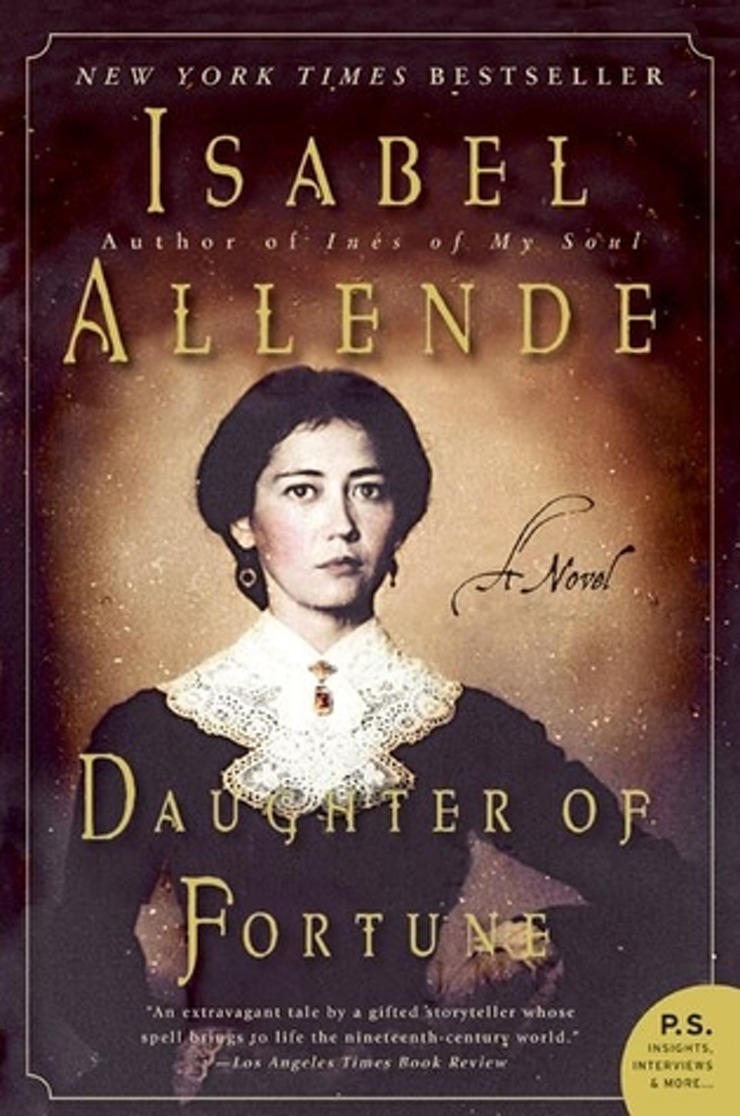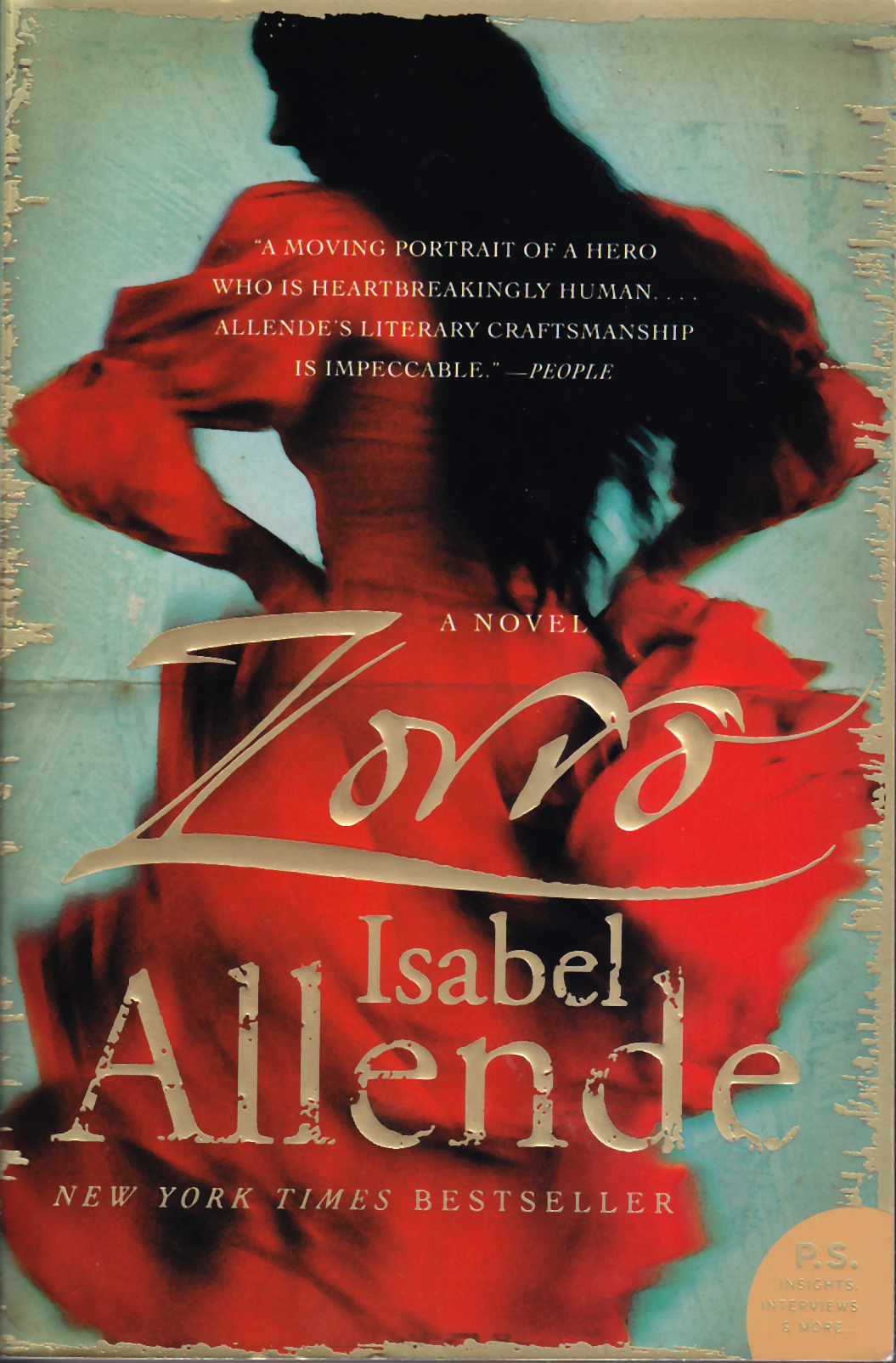Isabel Allende
Books: Fantasy | YA
Daughter of Fortune (1999), Zorro (2005)
Kids
Kingdom of the Golden Dragon (2004)
Kingdom of the Golden Dragon (2004) translated by Margaret Sayers Peden
 Alexander Cold asks his grandmother, Kate, if he can accompany her on her latest expedition for International Geographic, this time to a remote country in the Himalayas. A country nicknamed The Forbidden Kingdom, because of its far location and the fact that very few are allowed to visit each year. Elsewhere in the Himalayas, Dil Bahadur, disciple to the Buddhist monk Tensing, travel and see unexpected wonders, as Dil Bahadur trains and prepares for his future.
Alexander Cold asks his grandmother, Kate, if he can accompany her on her latest expedition for International Geographic, this time to a remote country in the Himalayas. A country nicknamed The Forbidden Kingdom, because of its far location and the fact that very few are allowed to visit each year. Elsewhere in the Himalayas, Dil Bahadur, disciple to the Buddhist monk Tensing, travel and see unexpected wonders, as Dil Bahadur trains and prepares for his future.
I picked this (and several other books) up at the Bookshelf clearance sale. I figured that for 30% off I could stand to pick up some new authors, and although I am still trying to read Daughter of Fortune, I decided that at 30% off I'd try something different, to see if I liked it better.
What I didn't realize is that Kingdom of the Golden Dragon is the second book in a trilogy. Luckily, this trilogy is three books with the same characters, rather than the traditional fantasy where it takes three books to tell a single story. I had no difficulty picking up the story, and the story arc was concluded within this book, so the draw for reading the other books is that you liked the characters and want to spend more time with them, rather than a desperate need to learn what happened. I have tremendous respect for fantasy authors who are able to do this, so that right there predisposed me to like this book.
And I did like Kingdom of the Golden Dragon. It's a young adult novel, which means that there's no sex and no swearing (which may automatically elevates it above some "adult" novels) so she had to build some degree of romantic tension between the teenage characters without resorting to boinking. And in this she also succeeded.
I think what I liked best about this story is that the adult characters are not morons, and the teenagers don't act as if the adults around them are idiots. Even when Alexander and Nadia do something foolhardy, there's a reasonable explanation as to why they followed that course of action.
The characters in this story are wonderful. Alexander, Nadia, Dil Bahadur, and Pema are all very likable, and the kind of teenagers you wish you ran into more frequently. (Although I have a feeling that Alexander wasn't so wonderful at the start of the previous book, though I could be wrong.) And although the teenagers are the focus of this story, the adults are also interesting, and even the bad guys had reasons for the actions. Although I can read stories were the bad guy is evil solely because he is insane and evil, it's always more satisfying when you can see why a bad guy might act the way he did (and I'm using he in a gender neutral term here.)
Although I did figure out the main plot point about halfway through, it didn't bother me, because things were so well done I was just enjoying reading along.
What I had hated so much about Seraphim was the clumsy way in which the author tried to hide the gender of the main character at the start of the book. It was badly and obviously done. Here something similar was done, however, here it was only after I realized that Judit was the Specialist that I realized that the Specialist had only been described in gender neutral terms. In fact, I had to go back to check a passage about the Specialist, to make sure that I wasn't drawing an incorrect conclusion. Kudos!
END SPOILER
All in all, the book is well-written, the plot is well-done, the characters were interesting and likable, and in general the book was a lot of fun to read. And, although this is the second book in a trilogy, you can easily pick this up without having read the previous book, and enjoy the story and the characters.
May 2006 | Rating: 8/10
Daughter of Fortune (1999)
 So, I started reading this book in 2006 or possibly even 2005.
So, I started reading this book in 2006 or possibly even 2005.
No, seriously.
I never gave up, because I did want to find out what happened, however, the book ended up at work, as my "OMG! I have an appointment and I don't have a book!" book. But since I almost always carry a book with me, it was very slow going.
Eliza was abandoned as a baby on the steps of the Sommers house, and adopted by Rose (a spinster) and (somewhat against his will) Rose's brother Jeremy. It is a strange childhood, and perhaps because she is raised by two siblings who were never married, Eliza falls into a relationship with an unsuitable young man. When the inevitable happens, Eliza decides her only recourse is to attempt to follow her lover to the Americas.
There were two parts I particularly liked about this story. First, was Eliza's relationship with Tao Chi'en, who saves her life, and her time spent wandering around as a young boy.
Is this an historically accurate depiction of the west during the Gold Rush? Probably not. But it was interesting, and the individuals Eliza meets feel real and distinct.
So why did it take me so long to read this book? Because although it was interesting, it never truly grabbed me. I could read a couple pages, put the book down, and then be fine not reading any more for months. That doesn't make it a bad book by any stretch of the imagination. It simply because that the story interested me, but didn't suck me in to the point of no return.
September 2010 | Rating: 6/10
Zorro (2005) translated by Margaret Sayers Peden
 As I've mentioned before, I love swashbuckling adventures, and as swashbuckling adventurers go, Zorro is one of my favorites.
As I've mentioned before, I love swashbuckling adventures, and as swashbuckling adventurers go, Zorro is one of my favorites.
Last summer, when "The Legend of Zorro" was out, I saw this book, but assumed it was related to the movie, and didn't pick it up.
My mistake.
Isabel Allende tells the story of Diego's childhood and youth--the events in his life that turned him into Zorro, while allowing him to play the fop to keep his identity secret. We learn of his birth, and the birth of Bernardo, and how the two grew up together, and influenced each other. It also tells of his time in Spain, where he continued to learn to fence--and where he fell in love.
I really enjoyed this book. Fencing, fighting, pirates--and just a touch of romance. I loved seeing how Diego and Bernardo grew into the men they became. And I especially liked Bernardo's character. One of the things I remember most clearly is a scene with Bernardo, and I always wanted to know more about him. And there is lots in this story about Bernardo.
In many ways, this is the book that I wanted The Mark of Zorro to be. Diego is intelligent, athletic, daring, and romantic. Bernardo is strong, loyal, and wise. Plus, she has added in some strong female characters--an added bonus.
The pacing of the story was very good. It moved quickly--as a swashbuckling adventure should--but there were lots of details about the time and place. Bits of the story reminded me of Arturo Perez-Reverte's Captain Alatriste. Maybe there's something about the time period; pistols were not yet reliable and convenient, so swords were still commonly used (although pistols made a nice ace in the hole.)
Diego is, of course, interesting. He has to grow into the man that we know he becomes, and we see the start of the conflict between Diego and Zorro--how he learns to keep them separate and to hide the truth, and also how he relies upon Bernardo to temper his wilder impulses.
Isabel Allende's Zorro is a worthy heir to the Zorro tradition, providing background and depth to one of the original superheroes--only a superhero whose feats came from athleticism and cunning rather than special powers and technology.
June 2006 | Rating: 8/10
